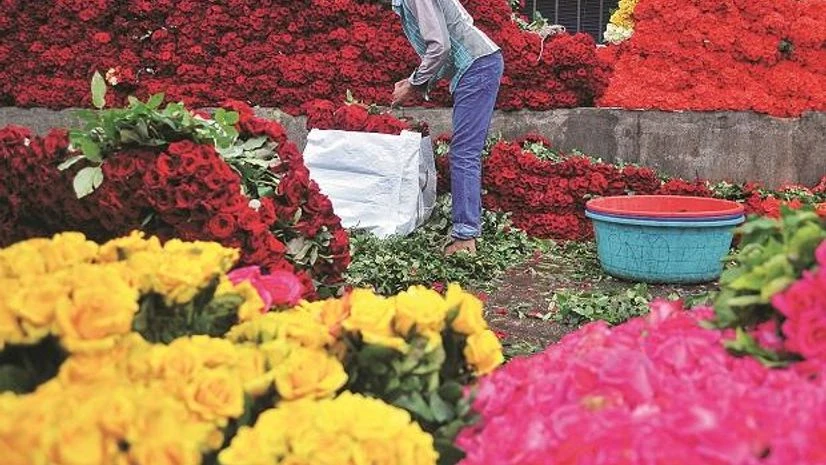The 10-day Dasara festival which was supposed to bring a smile to the faces of flower sellers and flower decorators of the iconic Krishna Rajendra Market in the heart of the city has failed to cheer them up so far.
K. R. Market (Krishna Rajendra Market), also known as City Market, is the largest wholesale market dealing in various commodities in Bengaluru.
It is named after Krishnarajendra Wodeyar, a former ruler of Mysuru. The market is located in the Kalasipalyam area, adjacent to the Tipu Sultan's Summer Palace.
K.R. Market was established in 1928. The location of the market is said to have been a water tank earlier and then a battlefield in the 18th century during the Anglo-Mysore Wars. Two buildings remain from the British era, at the front and back of the market area.
A riot of colours, countless baskets of flowers, haggling customers, and a chaotic madness which is surprisingly enjoyable, is what you will find in this market with numerous vendors lined up for business.
In this bustling market, the flower sellers are still sceptical about their business reaching the pre-Covid levels but many feel that this festival might at least help them reach a reasonable level of financial stability.
More From This Section
Most of the flower sellers say that their business has fallen by almost 65 to 70 per cent compared to the previous year. The worst affected in this segment are the flower decorators who say their business has fallen by 75 per cent to 80 per cent due to the closure of marriage halls, convention centres, schools and colleges.
Speaking to IANS, 45-year-old flower seller Shivarayappa said that people aren't buying flowers as much as they used to in the past.
"I sell garlands near temples but it has not picked up yet, I am waiting for Aayudha pooja to bring back my business to earlier levels. I used to sell a minimum of Rs 3000 to Rs 4500 worth of garlands but now I am not even reaching Rs 1000 to Rs 1500 per day. I strongly feel that is partially because of Adhika Masa (inauspicious month) followed by Pitrupaksha (another inauspicious fortnight), therefore, I might not have sold flowers as much as I used to sell last year," he explained.
According to him, Dasara is the only hope for the vendors to improve their business.
Another vendor Muniswamy who sells loose flowers said that rich shopkeepers and businessmen who used to buy truck loads of flowers every day to decorate the deities during the festival season, are not buying in such large quantities ever since the flower market reopened on September 1.
"I used to send huge quantities of flowers to Tirumala temple and Shirdi Sai Baba temple besides various other temples across the city, on the orders of businessmen to fulfil their vow to decorate such temples on a particular day of their choice," he said.
A flower decorator based in the City market, Nizmatulla Sharief, said "with no marriages, parties and corporate offices functioning with the lowest possible number of staff, people are not even thinking of celebrating Dasara in a big way this time. With less money in hand, flower decoration is the last priority for all, hence, no big decoration orders have come as yet."
The owner of Maruti Flower shop in Indiranagar H. Pradeep who had come to purchase flowers in the wholesale market, said that his last satisfactory business was in February and thereafter due to the lockdown he could not carry out any business. "Unless schools, colleges and corporates start functioning to full capacity, the demand for flowers will continue to be sluggish."
Bengaluru Flower Merchants Association president, G. M. Devaraj said that 2020 has been a very bad year for business. "City Market which thrives on customers is seeing very poor footfall. The current footfall is just 25 percent of what it used to be.
"Unless a Covid-19 vaccine is discovered, the market is likely to remain sluggish. Flower, vegetable and fruit sales go hand in hand. Until marriages and big conventions with large gatherings make a comeback, our business will remain dull," he added.
According to him it is a chain link -- marriages, gatherings, religious functions and political functions keep the kitchen fires burning.
"Perishable commodities largely depend on these and not home based customers. For instance, a person who works from home will always consume less in his/her house in comparison to when he/she goes out for work or attends public functions," he explained.
He added that the lockdown for nearly five months resulted in farmers who used to grow flowers opting for other crops. As a result of this, the quantity of flowers reaching the market has fallen to just 40 per cent compared to last year.
"Now again the same farmer will have to cultivate flowers once again and wait for them to bloom, which takes no less than three months from the day the farmer plants them. So for another four-five months, we may not get stocks like earlier," he said.
--IANS
nbh/bg
(Only the headline and picture of this report may have been reworked by the Business Standard staff; the rest of the content is auto-generated from a syndicated feed.)

)
